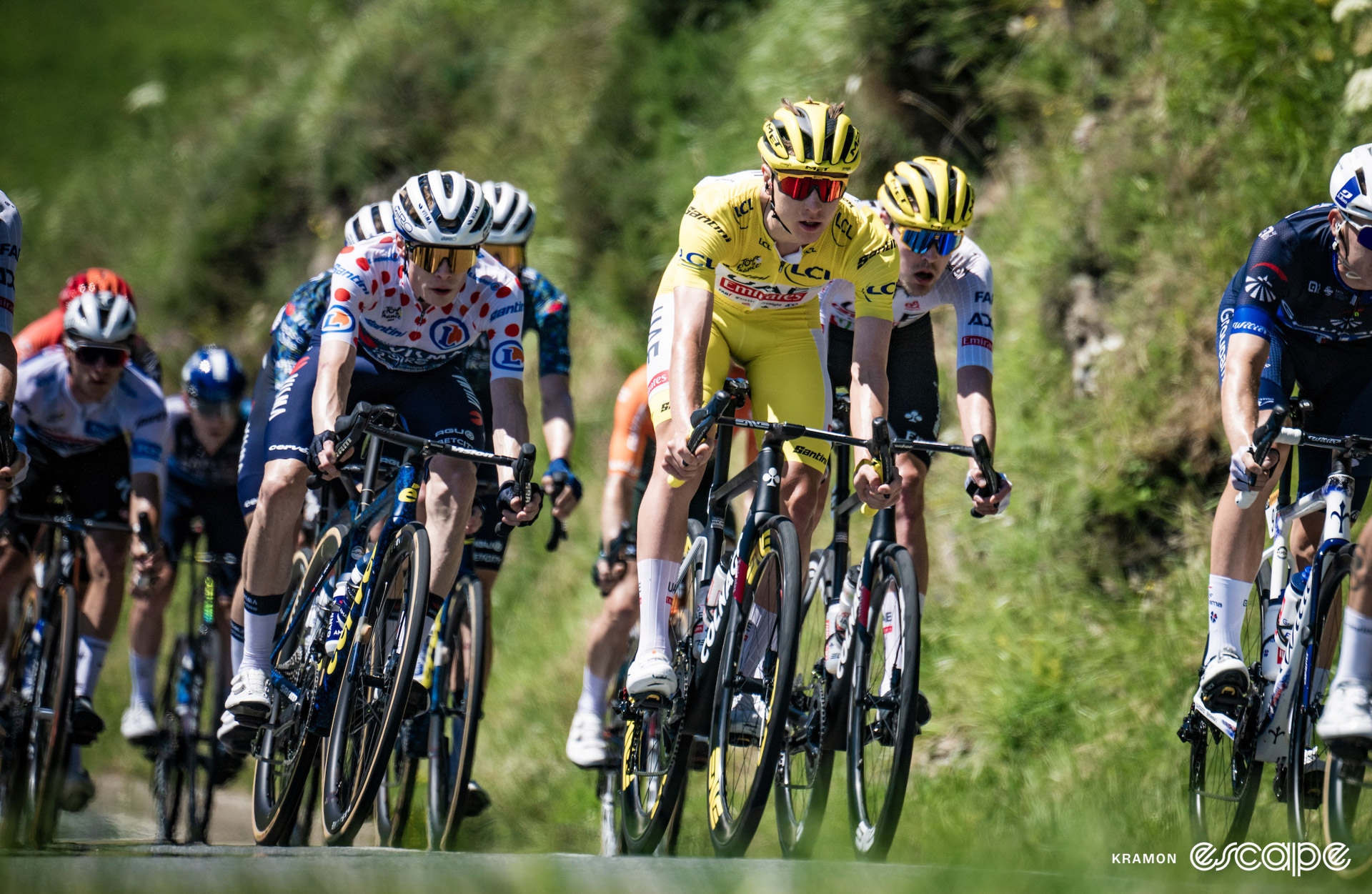Two weeks after Tour de France director Christian Prudhomme said that pro cyclists are going too fast, Tour de France winner Tadej Pogačar offered his own thoughts on the rider safety debate, addressing the subject (among others) in response to questions from Escape Collective at a press conference during the UAE Team Emirates training camp in Spain.
The 26-year-old Slovenian has a nuanced view of the state of affairs, acknowledging that speeds are increasing but also that such improvements are inherent to the nature of elite sport. He also suggested that certain positive steps are already being taken in the realm of cycling safety, while touching on other areas in need of improvement.
“Everybody wants to go faster all the time,” he said, addressing Prudhomme’s comments and reports of the UCI exploring ways to slow down the peloton. “The whole cycling world is developing like any other sport, breaking records every year and going faster and faster. Technology moves ahead, and in one way I totally understand that we cannot be stuck on a steel bike that goes 10 k per hour slower. Marketing doesn’t go so well selling the bikes the jersey, the helmets. Everything needs to improve.”
The faster average race speeds could make the sport more dangerous, and 2024 certainly had its fair share of major crashes, with massive pileups at Dwars door Vlaanderen and the Itzulia Basque Country just one week later both having huge impacts on the men’s racing season. That said, as Pogačar noted, crashes have always been a part of cycling.
“When you go faster there is more risk but I don’t think there were no crashes a hundred years ago, or no risk even if they were going 20 [kilometers per hour] average speed in a race and now we go almost 45,” he said.
Rather than focusing on throttling rider speeds, Pogačar pointed to the many other things that can be done to improve safety in the sport, highlighting course design first as a key element of the discussion.
“Organizers are trying with new barriers on the roads. In some ways they really good,” he said. “Choosing the right roads, for me, is crucial. Not to go over speed bumps when it’s 70 k per hour. Sensible finishes.”
He also pointed out that curves in the run-in to a race finish can be beneficial for reducing speeds, while opining that curves in the final meters of a sprint are dangerous.
Pogačar’s views on the implementation of the UCI weather protocol were similarly nuanced. He seemed pleased with its prevalence already but wants more to be done.
“There’s also the weather protocol. It’s getting used more and more, especially when there’s snow or rain, or super cold, they’re starting to apply it sometimes in the bigger races,” he said. “In smaller races, they are still using it too [little]. Thinking of the opposite side, it’s 45 degrees [Celsius] in some races, and people don’t care because in the car it’s air conditioned. I think it’s super dangerous. It’s even more dangerous riding 45 degrees full gas than 5 degrees, because when you get heat stroke it’s super dangerous.”
While Prudhomme’s November statements on the need to reduce rider speeds drew criticism (from the likes of Jonathan Vaughters) for shifting blame in safety issues to the athletes, Pogačar did not shy away from addressing the role riders play in their own safety.
“It’s on the riders most to be safe,” he said. “Don’t do stupid things in the bunch. You need to respect all the riders. It doesn’t matter who it is. Respect the road and you also need to think about your abilities on the bike.”
All told, he struck an optimistic note, pointing out that “everybody is trying their best I think.” That’s a different tone than Vaughters or other critics, but it’s unknown how widely held it is among his colleagues in the peloton.
Ronan Mc Laughlin was at the press conference and contributed reporting to this story.
Did we do a good job with this story?


